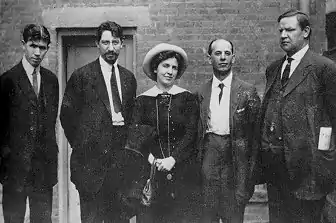Abraham Unger
Abraham Unger (1899–1975) was a 20th-Century American lawyer, co-founder and officer of the National Lawyers Guild, and partner in the law firm of Freedman and Unger. Defendants included: Communist Party (CPUSA), state-level Party organizations, individual Communist and Progressive activists, radical and/or Communist-associated labor unions and their leaders and activists, Puerto Rican nationalists, and fellow lawyers charged with contempt and other crimes in connection with their defense of radicals. Colleague Victor Rabinowitz noted in his memoir that Unger was "a lawyer who frequently represented the Communist party."[1][2]
Education
Unger graduated from New York University's Law School.[1]
Career
In 1931, Unger worked for the defense of the Scottsboro Boys as a member of the International Labor Defense (ILD), a branch of the CPUSA.[1]
In 1937, he helped co-found the National Lawyers Guild (NLG), served as a national officer, and headed its New York chapter for many years.[1] An investigative report on the NLG showed Unger as a national executive board member for 1949 and 1950.[3]
In 1949, he defended some of the twelve Party leaders in the Smith Act trials (charged with conspiring to advocate violent overthrow of the U.S. government).[1]

In 1951, Unger joined more than half a dozen other lawyers in defending 17 Communist Party members, including Elizabeth Gurley Flynn. The communists were accused of conspiring to "teach and advocate violent overthrow" of the government. The other lawyers were: Abraham L. Pomerantz, Carol Weiss King, Victor Rabinowitz, Michael Begun, Harold I. Cammer, Mary Kaufman, and Leonard Boudin. Later, they were relieved by O. John Rogge, gangster Frank Costello's lawyer George Wolf, William W. Kleinman, Joseph L. Delaney, Frank Serri, Osmond K. Fraenkel, Henry G. Singer, Abraham J. Gellinoff, Raphael P. Koenig, and Nicholas Atlas.[4]
In 1952, he petitioned for the commutation of Oscar Collazo’s life sentence for his attempted assassination of U.S. President Harry S. Truman.[1]
In 1953, he faced indictment for contempt, specifically refusing to answer questions from Senator Joseph McCarthy before the U.S. Senate Permanent Subcommittee on Investigations (currently called the "United States Senate Homeland Security Permanent Subcommittee on Investigations"). He also would not respond as to whether he headed the Party's section for professionals.[1]
In the mid-1950s, he defended Puerto Rican nationalist Juan Bernardo Lebron, charged as a conspirator in the 1954 attack on the U.S. House of Representatives.[1]
Personal and death
Rabinowitz's circle of Communist-leaning lawyer friends included Unger, Harry Sacher, David Freedman, David Rein, Joseph Forer, and Marty Popper.[2]
Like Popper, Unger defaulted to invocation of the Fifth Amendment as a standard operating procedure for clients.[2]
See also
References
- "Guide to the Abraham Unger Papers TAM.157: Historical/Biographical Note". Tamiment Library. January 2017. Retrieved 5 August 2017.
- Rabinowitz, Victor (1996). Unrepentant Leftist: A Lawyer's Memoir. University of Illinois Press. pp. 45, 114 (Communist), 122 (circle), 123 (Fifth). ISBN 9780252022531. Retrieved 5 August 2017.
- "Report on the National Lawyers Guild, Legal Bulwark of the Communist Party". U.S. Government Printing Office (GPO). 1950. pp. 18, 19. Retrieved 28 November 2016.
- "Judge Relieves Defense Aides In Red Trial". Washington Post. 9 August 1951. p. 2.
External links
- "Guide to the Abraham Unger Papers TAM.157: Historical/Biographical Note". Tamiment Library. January 2017. Retrieved 5 August 2017.
- Rabinowitz, Victor (1996). Unrepentant Leftist: A Lawyer's Memoir. University of Illinois Press. ISBN 9780252022531. Retrieved 5 August 2017.